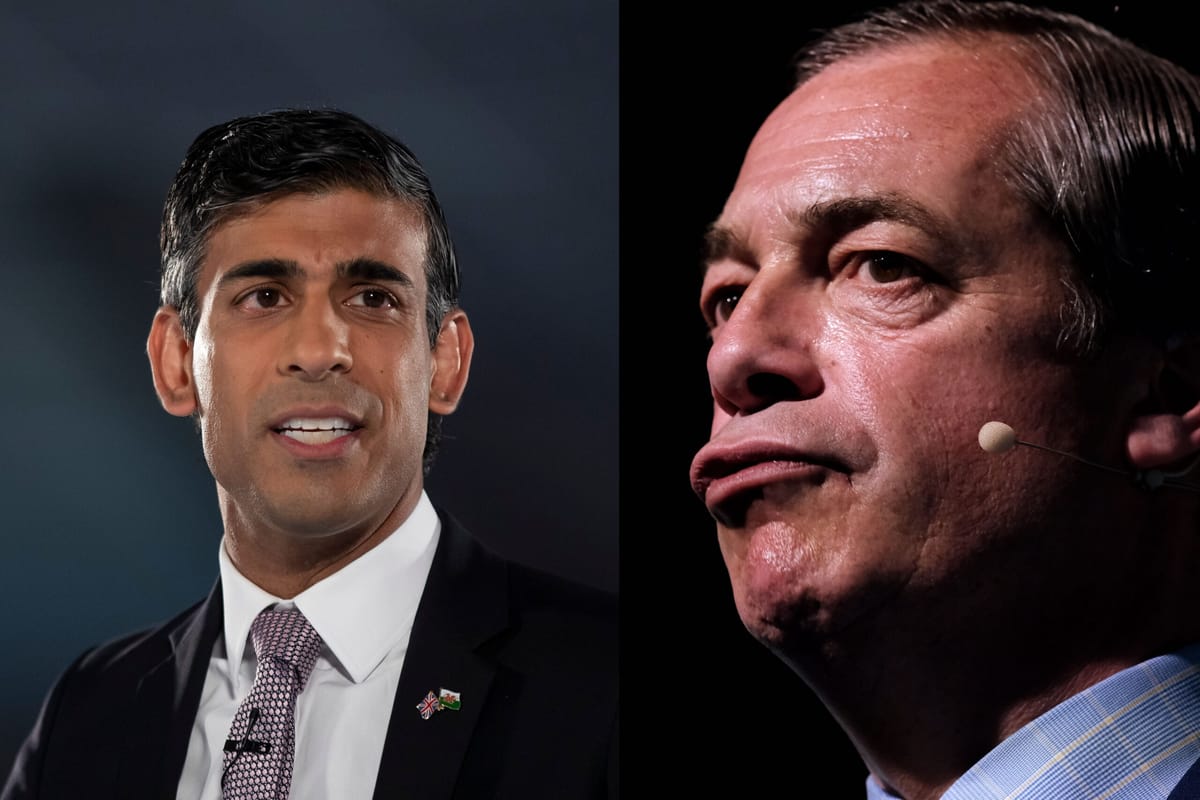Analysis: The UKIP-isation of the Conservative party

By Felix Flanagan, BA Politics
The biggest headline to come from the recent Conservative party conference in Manchester was certainly the dismembering of HS2. A perhaps even more significant takeaway, however, was the focus on ‘culture war’ issues. Views once reserved for far-right Tory backbenchers appeared at the forefront of the agenda. From Rishi Sunak’s attack on the trans community to Suella Braverman’s warning of a ‘hurricane’ of mass migration to come, it appears that the party has made a significant shift towards the right.
One surprise to come from the party conference was the appearance of Nigel Farage, surrounded by cameras and eager crowds of young Conservatives. The former leader of UKIP and the Brexit Party officially attended in his capacity as a presenter for GB News. However, many commentators agree that his presence marked something more significant. Just days after the conference, Farage was asked about the possibility of him re-joining the Tories. He did not rule this out, following up with, ‘Once they’ve lost the election, then I think my influence over where they go might be rather bigger.’ In another interview he was questioned on whether he believed the Tory party had moved towards him or vice versa, ‘I haven’t changed. I haven’t moved for years. I’ve been utterly consistent for 20 years on the things that I believed and campaigned for.’ Reflecting this policy shift, former Conservative MP David Gauke said that when he was elected he was one of the Party’s right. Yet, he continued that the shifting ground beneath his feet had landed him now on the left wing of the party.
Beyond the prevalence of Farage and his potential to rejoin the Conservative party, some have pointed to the similarity between contemporary Tory policy and former UKIP views.
One of UKIP’s pledges echoed at the recent party conference by Chancellor Jeremy Hunt, was the idea of cutting the size of the civil service. Though hardly a novel idea to the party’s right-wing, ideas like this taking the forefront at the conference once again, point to a rightward swing in the party.
Another example is the implementation of an Australian-style points-based system to manage immigration, found in UKIP’s 2015 manifesto and enacted by Boris Johnson’s government.
The Conservatives, and formerly UKIP, have also both launched attacks on green policies. Following backlash from ULEZ, it appears that Sunak believes that showing that he is ‘on the side of motorists’ will justify his backsliding on climate commitments and win over voters.
The Prime Minister’s turnaround from the slick, pragmatic Chancellor to avid culture warrior was seen in his speech to the conference where he stated; ‘We shouldn’t get bullied into believing that people can be any sex they want to be. They can’t.’ Again, links can be drawn to Farage, who vocally supported Trump’s ban on transgender people serving in the military.
Matthijs Rooduijn, the political scientist at the University of Amsterdam, said of Braverman’s speech; ‘This was a populist, radical-right speech like you’d get from Le Pen in France.’ The Home Secretary later suggested that the Human Rights Act, which incorporates the European Convention of Human Rights (ECHR) into domestic legislation, be renamed the ‘Criminal Rights Act.’ The ECHR has long been criticised by UKIP, and now too by the newly mainstream right-wing of the Conservative party.
Researcher Charlie Ellis has called this phenomenon the ‘narrowing of the British Conservative Mind.’ He suggests that the right of the party has ‘hubristically overinterpreted’ the Brexit result and recent electoral success, leaving them overconfident with the popularity of these right-wing views with the public. Guardian columnist Polly Toynbee has suggested the certainty of defeat at the next election has ‘liberated the party to lurch further to the right.’ Some, though, believe that the Conservatives are not right-wing enough. One individual interviewed outside the British National Conservatives conference, organised by a right-wing US thinktank, claimed ‘it’s not really a right-wing government. It’s very liberal and it follows the Labour party maybe five or ten years behind.’ Columnist Andy Beckett has suggested that both Labour and the Conservatives have been shifting rightwards, but that this has been the default in the run-up to elections since Margaret Thatcher, as swing voters are assumed to be Conservative on social issues. The majority of political commentators, however, seem to agree that there has been a clear shift to the right in the party over recent years.
TLDR; News suggested that Sunak has two options if he is to win the next election. One depends on him arresting this rightward swing, which could help unify the party and attract centrist voters. However, political analyst Jon Henley suggests that Conservatives have begun to embrace ‘textbook populism,’ indicating a return to the centre is unlikely. The other pathway to electoral victory given by TLDR analysts is for Sunak to double down on his right-wing credentials. It was, after all, not him but his predecessor Liz Truss who was elected by the party. Truss found early popularity for her reverence for tax cuts. Perhaps, if Sunak committed to doing the same, it could appeal to the party’s base and win over voters.
“Many things said by Conservative politicians in recent years could easily have been recited from the pages of UKIP’s 2015 manifesto.”
Photo Caption: Left: Conservative party leader Rishi Sunak. Right: Former UKIP and Brexit party leader and GB new host Nigel Farage(Credit: Shutterstock)



